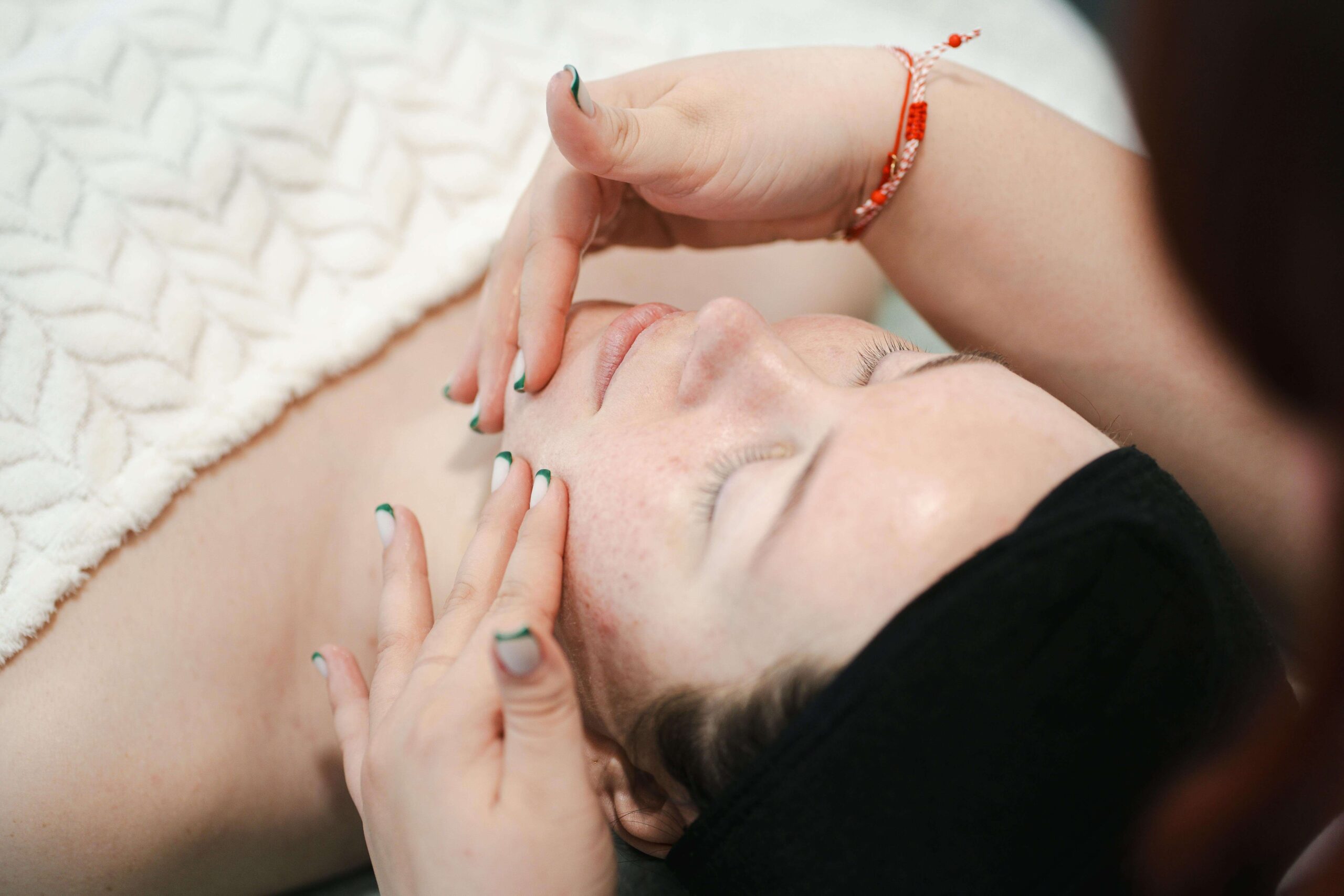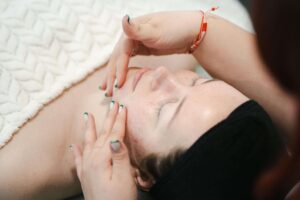Menopause brings many changes, both physical and emotional. But, you can manage these symptoms with natural solutions. This guide will show you how to find relief and improve your well-being during this time.
If you’re struggling with hot flashes, night sweats, or mood swings, this article can help. It offers a path to better health with herbal remedies, diet changes, and lifestyle tweaks. Start your journey to a balanced, rejuvenated life with nature’s help.
Table of Contents
ToggleKey Takeaways
- Discover effective natural solutions to manage menopause symptoms
- Explore herbal remedies and plant-based alternatives for hot flashes and night sweats
- Learn how dietary changes and exercise can alleviate menopausal discomforts
- Understand the role of mindfulness and stress relief techniques in managing menopause
- Embrace a holistic, naturopathic approach to find personalized relief
Understanding Menopause and Its Symptoms
Menopause is a natural change that marks the end of a woman’s ability to have children. It’s a big step in a woman’s life, signaling a shift from her fertile years to a new phase. Knowing what is menopause and the common menopausal symptoms helps women handle this change better.
What Is Menopause?
Menopause is when a woman stops having her period, usually between 45 and 55 years old. It happens as the ovaries make less estrogen and progesterone, the hormones that control the menstrual cycle. Women may feel many common menopausal symptoms as their body adjusts to these changes.
Common Menopausal Symptoms
Women may feel these common menopausal symptoms during this time:
- Hot flashes: Sudden feelings of intense heat, often accompanied by flushing and sweating
- Night sweats: Profuse sweating during sleep that can disrupt sleep patterns
- Mood changes: Increased irritability, anxiety, or depression
- Vaginal dryness: Decreased lubrication and elasticity, leading to discomfort or pain during intercourse
- Sleep disturbances: Difficulty falling or staying asleep, as well as restless sleep
- Decreased libido: Reduced sexual desire
- Cognitive changes: Difficulty concentrating, memory lapses, or “brain fog”
The common menopausal symptoms can differ a lot from one woman to another. They can also vary in how severe and long they last. Understanding these changes and getting support can help women go through this transition better.
“Menopause is a natural and inevitable part of a woman’s life. By understanding the process and its associated common menopausal symptoms, women can take steps to manage the changes and maintain their overall health and well-being.”
Herbal Remedies for Hot Flashes
Women often face hot flashes during menopause, a common symptom. Many look for natural ways to ease this discomfort. Luckily, studies show that some herbs can help manage hot flashes.
Black cohosh is a top herb for hot flashes. Native to North America, it has been used for centuries to ease menopause symptoms. It might lessen hot flashes by affecting estrogen levels.
Evening primrose oil is also known for its benefits. It’s full of gamma-linolenic acid, a fatty acid. This acid could help balance hormones and reduce hot flashes.
| Herbal Remedy | Potential Benefits for Hot Flashes |
|---|---|
| Black Cohosh | May help reduce the frequency and intensity of hot flashes by influencing estrogen levels |
| Evening Primrose Oil | May help regulate hormonal balance and alleviate hot flashes due to its gamma-linolenic acid content |
| Red Clover | Contains phytoestrogens that may mimic the effects of estrogen, potentially providing relief from hot flashes |
Red clover is another herb that might help with hot flashes. It’s full of phytoestrogens, which act like estrogen in the body. These compounds could ease hot flash symptoms.
Before trying these herbal remedies, talk to a healthcare professional. Everyone’s body reacts differently, so a personalized approach is best for finding relief.
Natural Treatments for Night Sweats
Menopause can cause many uncomfortable symptoms, including night sweats. Luckily, there are natural treatments that can help.
Lifestyle Changes to Manage Night Sweats
Changing your lifestyle can help with night sweats. Keep your bedroom cool and well-ventilated. Wear clothes made of breathable fabrics. Avoid spicy foods and alcohol to reduce sweating at night.
Herbal and Natural Supplements for Night Sweats
Some herbal supplements can also help with night sweats. Sage, valerian, and wild yam are examples of natural remedies. But, always talk to a healthcare professional before starting any new supplements.
Combining lifestyle changes with natural supplements can help manage night sweats and other menopause symptoms. These natural treatments offer a gentle way to find relief and support your well-being during this time.
Dietary Changes to Manage Menopause
Going through menopause means making changes to your diet can help a lot. By picking the right foods and avoiding others, you can ease hot flashes and mood swings. This can make life easier during this time.
Foods to Include in a Menopause-Friendly Diet
Adding these foods can help keep your hormones balanced and ease menopause symptoms:
- Soy-based products, like tofu, tempeh, and edamame, have phytoestrogens that act like estrogen
- Flaxseeds and chia seeds are full of omega-3 fatty acids and lignans, which can help with symptoms
- Fruits and veggies, especially leafy greens, berries, and cruciferous ones, are full of antioxidants and fiber
- Whole grains, legumes, and nuts offer complex carbs, protein, and healthy fats
- Dairy items, such as low-fat milk, yogurt, and cheese, are good for bone health
Foods to Avoid During Menopause
Some foods can make menopause symptoms worse. Try to eat less or avoid these:
- Spicy and fried foods can make hot flashes worse
- Caffeine and alcohol can mess with sleep and mood
- Processed and sugary foods can lead to weight gain and inflammation
- Salt-heavy dishes can make water retention and bloating worse
By making smart dietary changes for menopause, you can use menopause-friendly foods to ease symptoms. This supports your health during this big change in life.

Exercise for Menopausal Symptoms
Women going through menopause can find relief with regular exercise. It helps ease hot flashes and night sweats. Plus, it keeps them feeling good overall during this change.
Aerobic activities like brisk walking, swimming, or cycling are great. They help control body temperature and lessen hot flashes. They also make sleep better.
Strength training is another good choice. It includes lifting weights or doing bodyweight exercises. This type of exercise builds muscle, speeds up metabolism, and helps with joint and muscle pain.
Yoga and Tai Chi are also great options. They help with stress and improve flexibility and balance. These are key for women going through menopause.
| Exercise Type | Benefits for Menopausal Symptoms |
|---|---|
| Aerobic Exercise | Regulates body temperature, reduces hot flashes and night sweats, improves sleep |
| Strength Training | Builds muscle mass, boosts metabolism, alleviates joint pain and muscle aches |
| Yoga and Tai Chi | Promotes relaxation, reduces stress, improves flexibility and balance |
Combining aerobic, strength, and low-impact exercises helps women. It makes menopausal symptoms less severe. And it keeps them healthy during this big change.
“Regular physical activity can be a game-changer in managing the symptoms of menopause. It’s not only about finding relief but also about empowering women to take charge of their health and well-being.”
Mindfulness and Stress Relief Techniques
Going through menopause can be tough. But, using mindfulness can help a lot with stress and anxiety. Meditation and yoga are great for stress relief for menopausal symptoms. They help you feel better overall.
Meditation and Yoga for Menopause
Mindfulness meditation can change your life if you’re going through menopause. It helps you focus on now and accept your feelings. This can ease the emotional ups and downs from hormonal changes. Meditation and yoga for menopause also improve sleep, lower anxiety, and bring peace inside you.
Deep Breathing and Relaxation Exercises
Deep breathing exercises for menopause are also very helpful. Simple breathing methods, like diaphragmatic breathing, can calm you down. They make you feel relaxed and lessen stress’s effects. These mindfulness techniques for menopause are easy to do every day. They’re a great way to feel better during this time.
Natural Solutions for Menopause Symptoms
Going through menopause can be tough, but using natural ways can help. We’ve looked at many natural remedies and ways to change your life. These can ease the symptoms of this stage.
There are many ways to tackle menopause symptoms naturally. You can try herbal remedies, change your diet, or manage stress better. By using a full and natural plan, women can keep their quality of life during this big change.
A Multifaceted Approach
Dealing with menopause symptoms often means using different natural ways. Some important things to think about include:
- Using herbal remedies like black cohosh or evening primrose oil for hot flashes and night sweats
- Eating a diet good for menopause with lots of plant-based foods, whole grains, and healthy fats
- Exercising regularly to help your mood, manage weight, and get better overall health
- Doing stress-relieving things like meditation, yoga, and deep breathing to relax and sleep better
By mixing these natural ways, women can find a full approach to handle menopause symptoms. This can make their life better during this big change.
| Natural Solution | Benefits for Menopausal Symptoms |
|---|---|
| Herbal Remedies | Help with hot flashes, night sweats, and mood changes |
| Dietary Changes | Help with weight, bone health, and balance hormones |
| Exercise | Boost mood, improve sleep, and keep up physical and emotional health |
| Stress-Relieving Techniques | Lower anxiety, better sleep, and relax more |
By taking a natural approach to menopause symptoms, women can feel better, stay healthy, and do well during this big change in life.
Phytoestrogens and Plant-Based Alternatives
Women going through menopause often look for natural ways to ease their symptoms. Phytoestrogens, which are plant compounds similar to estrogen, are seen as a good option instead of traditional hormone therapy. These natural substances can help menopausal women feel better.
Soy and Its Benefits for Menopause
Soy is a top source of phytoestrogens and has been studied for its benefits during menopause. Foods and supplements made from soy can lessen hot flashes, night sweats, and other symptoms. Soy’s isoflavones work like human estrogen, connecting with estrogen receptors in the body to help ease symptoms.
Other Phytoestrogen-Rich Foods
- Flaxseeds: These are full of lignans, a type of phytoestrogen, and may lessen hot flashes and vaginal dryness.
- Chickpeas: Known as garbanzo beans, they have a lot of phytoestrogens and could help with menopause symptoms.
- Berries: Blueberries, raspberries, and blackberries are great for phytoestrogens, offering benefits for menopausal women.
- Broccoli and other cruciferous vegetables: These veggies have indole-3-carbinol, a phytoestrogenic compound.
Eating a mix of phytoestrogen-rich foods can be a natural way to handle menopause challenges. By using these plant-based compounds, women can find relief and support their health during this life change.

Naturopathic Approach to Menopause
Women going through menopause can find relief with a naturopathic approach. This method uses herbal remedies, supplements, and lifestyle changes. These help with hot flashes, night sweats, mood swings, and other symptoms.
Herbal Remedies and Supplements
Naturopaths suggest herbs like black cohosh, evening primrose oil, and red clover. These help balance hormones and ease menopause symptoms. Phytoestrogens in soy and flax offer natural estrogen support. Supplements like vitamin E, omega-3s, and magnesium also help with hot flashes and mood changes.
Lifestyle Modifications
- Stay active to improve circulation, reduce stress, and keep a healthy weight.
- Use stress-reducing activities like meditation, yoga, and deep breathing.
- Improve sleep by having a regular bedtime routine and a cool, dark room.
- Eat a diet rich in whole foods, healthy fats, and water.
These strategies help women feel better during the menopause transition.
“Menopause is a natural process, not a disease to be treated, but a transition to be supported with natural remedies and lifestyle modifications.”
Managing Menopause Symptoms Naturally
Going through menopause can be tough, but you can find ways to handle your symptoms naturally. It’s all about finding the right mix of remedies that fit your life and needs.
Creating a Personalized Plan
Menopause affects everyone differently, so it’s key to make a plan just for you. Begin by noting down your symptoms, like how often and what triggers them. This helps you see where you need help the most.
After understanding your symptoms, look into natural ways to help. Consider trying:
- Herbal remedies for hot flashes and night sweats
- Dietary changes to support hormonal balance
- Exercise routines to manage mood and weight changes
- Stress-relief techniques to promote overall well-being
Combining Different Natural Solutions
Using a mix of remedies is often the best way to tackle menopause symptoms. Try out different combinations and see what works best for you.
For instance, you could eat soy-based foods or take supplements for hot flashes. Adding regular exercise and mindfulness can also help with stress and mood. Adjust your plan as needed for the best results.
Remember, managing menopause symptoms naturally is a personal journey. By making a plan tailored to you and trying various remedies, you can find relief and balance during this time.
Consulting with Healthcare Professionals
When dealing with menopausal symptoms naturally, talking to healthcare pros is key. Working with your doctor or a skilled naturopathic practitioner ensures you use natural solutions safely and effectively.
Gynecologists and integrative medicine experts can guide you on using herbs, supplements, and lifestyle changes. They help you pick the right approach for your menopause issues. They make sure your chosen remedies fit your health and any other health conditions you have.
Talking to healthcare pros for menopause gives you valuable advice and a tailored plan to manage your symptoms. This teamwork can help you find the best natural solutions for you.
“Working with doctors for natural menopause solutions can make a significant difference in your overall well-being during this transitional phase of life.”
Your healthcare team supports you during your menopause journey. Don’t be shy to ask for advice on natural remedies and lifestyle changes. These can help ease your symptoms and better your life quality.
| Healthcare Professional | Expertise in Menopause |
|---|---|
| Gynecologist | Specializes in women’s reproductive health, including menopause management. |
| Naturopathic Doctor | Trained in natural and integrative approaches to women’s health concerns, including menopause. |
| Integrative Medicine Practitioner | Combines conventional and complementary therapies to address menopausal symptoms holistically. |
Conclusion
This guide has shown how a natural and holistic approach can help with menopause symptoms. We’ve looked at herbal remedies, diet changes, mindfulness, and exercise. These natural solutions offer a broad way to tackle the challenges of menopause.
By understanding the causes of menopause symptoms, women can take charge of their health. They can find relief from hot flashes, sleep better, and manage mood swings. The natural remedies we’ve talked about can make menopause more comfortable and empowering.
For a successful journey through menopause, a personalized, holistic approach is key. By using these natural strategies, women can ease symptoms and improve their overall well-being. This can make this life stage more fulfilling and resilient.
FAQ
What are some natural solutions for managing menopause symptoms?
Natural ways to handle menopause symptoms include using herbs, eating better, exercising, and finding ways to relax. You can also try phytoestrogens and a mix of natural treatments with a naturopathic approach.
What are some effective herbal remedies for hot flashes?
Herbs like black cohosh, evening primrose oil, and red clover can help with hot flashes. They work by mimicking estrogen and easing symptoms.
How can diet and lifestyle changes help manage night sweats?
Keeping your bedroom cool and wearing light clothes can help with night sweats. Adding herbs like sage and supplements like valerian can also help. Changing your diet and avoiding certain foods can make a difference too.
What type of exercise is recommended for menopausal symptoms?
Doing regular exercise, like running, lifting weights, and yoga, can ease menopause symptoms. It also boosts your overall health during this time.
How can mindfulness and stress relief techniques help with menopause?
Practices like meditation, yoga, and deep breathing can ease stress and anxiety linked to menopause. They help improve your well-being.
What are the benefits of phytoestrogens and plant-based alternatives for menopause?
Phytoestrogens, found in plants, can help with menopause symptoms by acting like estrogen. Foods like soy are good examples of natural options instead of hormone therapy.
What is the naturopathic approach to managing menopause?
The naturopathic way to handle menopause uses herbs, supplements, and changes in lifestyle. It aims to lessen symptoms and support health during this change.
How can I create a personalized plan to manage my menopause symptoms naturally?
To make a plan for your menopause symptoms, mix different natural methods. This could be herbs, diet changes, exercise, and stress relief. Find what works best for you.
When should I consult with healthcare professionals for managing menopause naturally?
It’s key to talk to doctors, like gynecologists or naturopaths, for natural menopause relief. They can help ensure you’re using natural methods safely and effectively. They can also address any health issues you might have.









